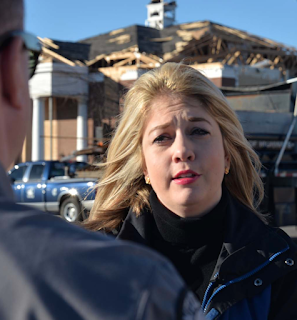 |
| Louisville anchor Lauren Adams covering the disaster in her in-laws' hometown, Mayfield, Ky. (Poynter photo: Al Tompkins) |
Hometown journalists are not only providing some of the first and most comprehensive reporting on the disasters, but have probably saved lives, said Bill Evans, Western Kentucky vice president of Paxton, a Paducah-based, family-owned firm that owns most daily and weekly newspapers in the region.
Evans oversees the Paducah TV station and six newspapers, including the Mayfield Messenger, whose office was wrecked along with much of the town. When Stelter asked how they were covering the disaster, Evans said that area Paxton newsrooms have pooled resources for years, so it was "nothing new" to come together to help the Messenger cover the aftermath of the storms.
Stelter noted that many towns in Paxton's coverage area had 20 minutes' warning before the tornadoes hit and asked if Evans believed WPSD-TV's weather coverage had saved lives by alerting locals. Evans, visibly choking up, said: "I can't tell you the number of people that I've heard from yesterday morning that said that . . . and that's exactly what we do. It's not trite to say that." When meteorologists are hired, he said, they are told that their job in severe weather is to save lives.
Besides covering the storms' immediate aftermath, local news media will chronicle the towns' recovery long after reporters from nationwide publications go home. "Beyond all this destruction you see is the people that remain, and we know that we're going to rebuild, we know we have stories to tell, stories of heroic efforts, and stories of people that will go on," Evans said. "So yeah, we're not gonna be defined by rubble. We're gonna be defined by the spirit that is us, and we're gonna move forward."
Covering a hometown disaster can be heart-wrenching, but journalists say they feel called to do it, Western Kentucky native Al Tompkins writes for Poynter. Lauren Adams, a weekend anchor at WLKY in Louisville, spent six years as a reporter in Paducah, and her husband's family is from Mayfield. She insisted on covering the disaster. "Before I got here, I had a pit in my stomach," she told Tompkins. "It hurts so much to see a place I love in such pain. I tried to tell my family why we have to be here. Maybe the power of our words will move people to donate to help, maybe go give some blood. Maybe it will just make people pay attention to weather warnings next time ... These are such good people. I want to do my best for them."
Tompkins advises journalists covering the disaster to be mindful of their own mental health, especially after the trauma of the past few years: "For the next few weeks, you will see people cry over all they lost, you will hear heartbreaking stories of people who died, and it will hurt every time," he writes. "You will get through it because it is what you do. But sometime — you decide when — you are going to have to stop and deal with what you feel. That is not weakness, it is strength. Notice when your colleagues are hurting and reach out to them. Check on your bosses, too."
No comments:
Post a Comment